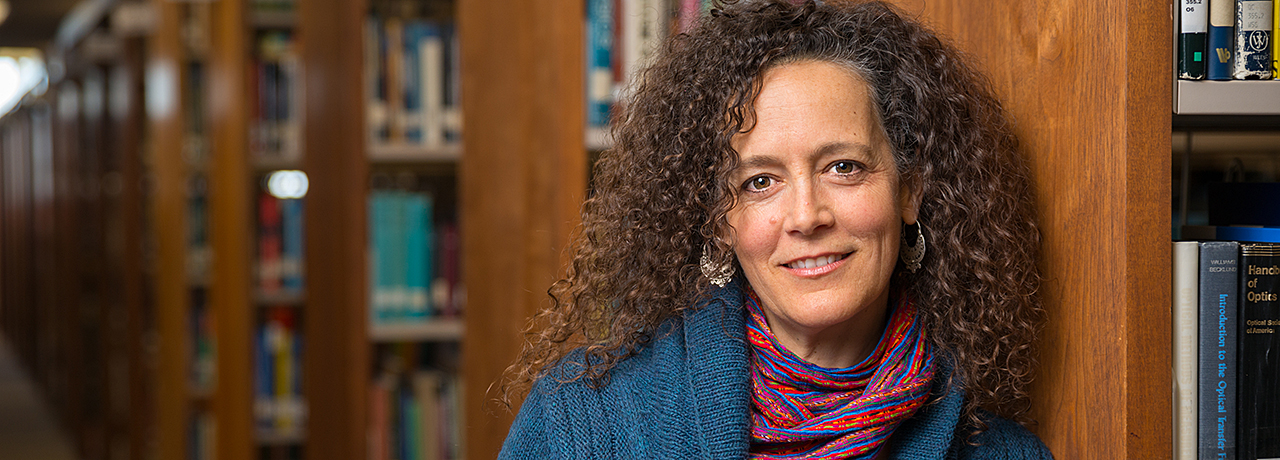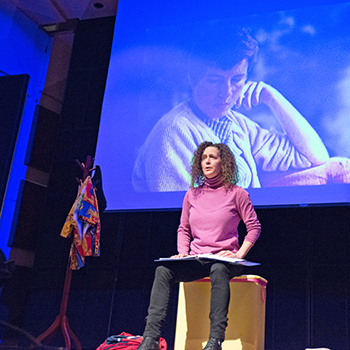
Photography by John Ternan
Alison Wearing is a gifted and accomplished writer and actor, but if asked what she does, she tailors her response to where she is — and who is asking.
“If I'm in Stratford, where there are so many wonderful actors, directors, producers, I say I'm a writer because there are so few writers there,” she says. “If I'm around writers, I might say I'm a performer. I often feel more qualified in the other area.”
No such modesty is required. Wearing's books, acclaimed for their lyricism, humour and humanity, and her one-woman storytelling on stage are parts of a whole, although it took actor/director Stuart Cox's description of her animated book readings as “theatre” for her to believe it.
On stage, with a prance, a cartwheel, a hunch or shrug of her shoulders or tilt of her head, her body language carries the audience from childhood to maturity as she acts out the story she tells so articulately and sensitively in book form. Props as simple as a smock, a silk scarf, a gold lamé jacket, and a screen behind her showing images of notorious police raids on Toronto's gay bathhouses juxtaposed with happy family photos, establish the passage of time for her narrative.
For Wearing (BA '89), one thing tends to emerge from another. Back in 2000, what started as a series of short stories about adventures and people encountered while travelling in a foreign land grew into her first book, Honeymoon in Purdah: An Iranian Journey. And in 2013, what began as a play and a type of remembrance was ultimately published as Confessions of a Fairy's Daughter: Growing Up With a Gay Dad, a memoir she now performs as a one-woman show.
Her writing is intensely personal, and both books, published by Alfred A. Knopf Canada, were classified as nonfiction. Wearing finds all such categories “unhelpful.” “I've never 'fit' in fiction or nonfiction; in fact I've never fit in any box my whole life,” she says in an interview at Wilf's on Laurier’s Waterloo campus. “There is so much colourful area in between.”

The foundation for Honeymoon was Wearing’s visit to Iran with a common-law partner. When they learned they would only be allowed into the country if they were married, they forged a marriage certificate and bought rings. Hence the title of the book, which was written a year after they broke up. “I didn't want the story to be derailed by our breakup. I had already made up characters to protect some people in Iran, and service to the narrative is a writer's ultimate responsibility,” Wearing says. “Yet somehow it was classified as travel/nonfiction.”
She feels the same way about Confessions of a Fairy's Daughter although it is firmly rooted in her family history. “The tough thing about a memoir is what to leave out — how to find a path through the wilderness of your life,” she explains. “I knew the book had to focus on the relationship between me and my father.”
Wearing was 12 when her mother revealed that her somewhat flamboyant, deeply loved father was gay. It was the late 1970s, before there were role models for gay men who were also caring husbands and fathers.
In writing the memoir, Wearing worried that by focusing on her dad she wouldn't do justice to her mother, a piano teacher enthralled by music, who was “there virtually always” as her children grew up. “It was not an easy book for my mother to read,” Wearing says.
Her mother comes to the fore later in the book when Wearing, 29 and broken-hearted after the collapse of her common-law relationship, retreats to her mother's home on a small farm in Cavan Township, southwest of Peterborough, where her mother was grieving the death of her second husband.
The women mourned together, her mother at the piano, Wearing through writing. Yoga, tea by the fire, long walks through fields and hardwood forests became their therapy: “Daily and in every weather we padded the same path; past the garden, alongside the pond, across acres of old pasture, over the shoulder of the wetland and into the forest. Day after day we circled its same loop, breathing in its geography until it swept into me and became part of my own.
Finally Wearing could ask her mother what she did after learning from a letter that her husband was gay. Her mother replied that she'd called her sister to look after the children, packed a tent and sleeping bag, a loaf of bread and tins of tuna into the car, and headed north:
“‘So what did you do — just lie in your tent and cry?’”
“‘No, I hiked up to the top of this big granite cliff overlooking the lake. It was so beautiful. I just couldn't believe how peaceful it was....Then at night, I went swimming. I'd never done that before, in the dark, no one else around.... Then I came home, hired a lawyer, filed for divorce on the grounds of homosexuality, and had the papers delivered to your dad's office at the university.’”
“We listened to Bach that night, and then my mother went to bed. I was brittle with exhaustion, but couldn't sleep. Eventually I got up and lit a fire in the back room, settled into the rocking chair and stared out the long windows, imagining her swimming in that quiet, dark lake.”

At 17, still unsettled by her father's sexual orientation, Wearing went on a student language exchange to France where she fell in love with exploring. At the end of the course, she bought a train pass and travelled for three months, sleeping in hostels, seeing free concerts and museums, and sharing food with transient friends. It was the start of her love affair with travel.
She entered university at Western, but transferred to Laurier for her second year after hearing her brother Peter (BA ’88) speak highly of his time at university. She was majoring in political science when she spotted a poster about studying at one of Europe's oldest universities. It led to “a marvellous watershed year” at Germany's University of Marburg, a year in which she visited the Middle East for the first time during a break between semesters.
When she returned for her final year at Laurier, Wearing found new purpose in organizing Green Week, held in the Laurier Concourse in March 1989. It could have been called Activism Week, given elements ranging from information tables on environmental and political issues, an Amnesty International petition and a Greenpeace lecture, to exiled Chileans painting a mural on canvas, and a debate between a Laurier professor and a Toronto-based representative of the African National Congress (ANC).
Green Week made The Cord's March 16, 1989 cover and, like any campus activity, it found believers and critics. The following week in The Cord, Wearing fired back at people who labelled her a “hypocritical lesbian Marxist” and called Green Week “a euphemism for a deceptive Communist plot.”
“It doesn't take much to agitate the lingering paranoid cold warriors,” she wrote. If the Music Association's Nicaraguan Benefit Concert booth raising money to buy sheet music for an impoverished orchestra “constitutes being a communist pig, then I guess I am guilty as charged.”
Acknowledging that she’s “just not a classroom learner,” Wearing did most of her learning outside through experience. So it’s little surprise she lived a peripatetic lifestyle for over a decade following university, exploring Germany, Israel, the Soviet Union, China and the Middle East, taking any day job that was available.
“I started travelling because I didn't have a sense of home,” she says. “I felt I didn't belong. Then I got the bug: I just loved learning about new places and languages.”
It was while living in Prague shortly after the “Velvet Revolution” in what was then called Czechoslovakia that she began to write, mostly journal entries or letters, although she also published an essay about Prague's government and a prize-winning short story.
“I travelled for 13 or 14 years before coming back to Canada to live. Then it was time to make peace with my home. In scorning where I was from, it was a type of self-loathing.”
Three years ago, after nearly a decade in Mexico, Wearing, her partner Jarmo Jalava and their son Noah settled in Stratford. Now 47, she's slightly amazed to find herself a first-time homeowner, but loves the location of their house around the corner from the Festival Theatre. “I didn't want to live in a big city,” she says. “I was looking for a European-style town, somewhere where we could walk or bike everywhere, and we can do that in Stratford. It's a small town with a big mind.”
It also suits Jalava, an ecological consultant whose work for clients including First Nations currently ranges from the Bruce Peninsula to the Carolinian forest. The couple met 17 years ago when Jalava was doing an ecological survey of her mother's land and Wearing answered his knock at the door.
Noah, now 15, was eager to attend high school in English, and spent two seasons performing with the Stratford Festival in Waiting for Godot and King John. Noah has “developed a love of the language of Shakespeare quite independently of me; it's kind of a music to him,” Wearing says.
Wearing estimates she is halfway through writing a novel. She started it eight years ago and doesn't know when it will be finished. Writers' lives are busier than they once were, “We're now expected to promote our writing, be on social media, blogging,” Wearing says.
Regularly invited to perform her one-act play based on Confessions of a Fairy's Daughter, she still gets involved, though to a lesser degree now, in booking venues and hiring technicians for it. The actual performance accounts for about 10 per cent of the time she devotes to getting her play on stage.
Wearing came to acting hesitantly. “I guess I'm a writer first, but I was resistant to working with a script because I like speaking extemporaneously — I can feel a dialogue even if the audience is not speaking.”
She began performing at theatre festivals, and something clicked when she read a review of a performance in Hamilton that called her a singer, actor and dancer. “I love dance and I sing, but I'm not wedded to the structure of theatre,” she says. “I'm still interested in exploring non-traditional presentations — that really lights me up.”
Frequently finding audiences on university campuses and, particularly with Confessions, in Pride groups — last summer she had a five-day run at WorldPride in Toronto — Wearing sometimes packages a performance with a book signing and a writing workshop the following day. “Then the show folds up so I can pack it into my car.”
At the same time, perhaps because her shows depend entirely on her, she finds it hard to move between acting and writing. She's become more guarded with her time and more selective about what she does. Ultimately, Wearing says, “What I'm most interested in is the territory between acting, writing and music.”